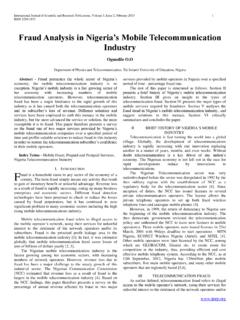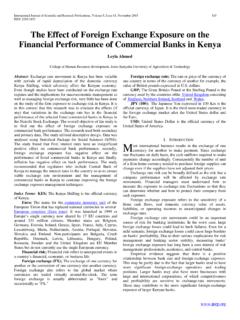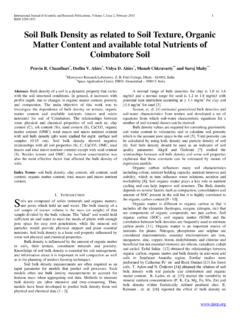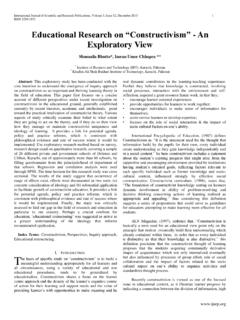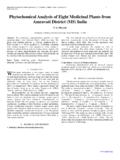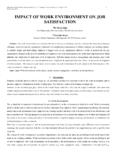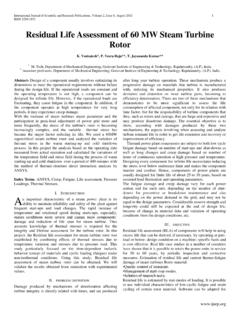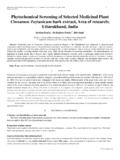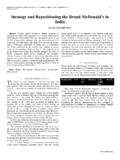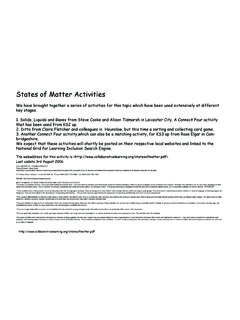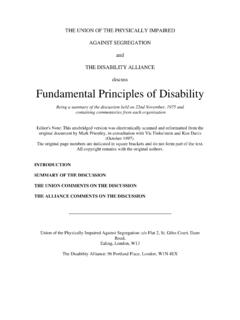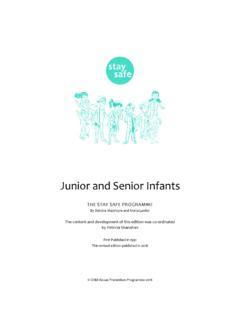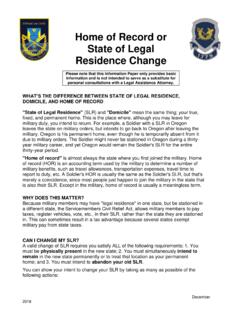Transcription of Constructivism in Science Classroom: Why and How
1 International Journal of Scientific and Research Publications, Volume 5, Issue 3, March 2015 1 ISSN 2250-3153 Constructivism in Science classroom : Why and How Dr. Sunita Singh *, Sangeeta Yaduvanshi ** *Dr. Sunita Singh, Assistant Professor , Faculty of education, Banaras Hindu University **Sangeeta Yaduvanshi, Research scholar Faculty of education, Banaras Hindu University Abstract- Constructivism is buzz word widely used in paradigm of teaching-learning. Constructivism emphasises how the learner constructs knowledge from experience, which is unique to each individual. In the present paper the areas of discussion are 1) historical background of Constructivism and its importance.
2 2) Role of mentor and learner in constructivist Science classroom . 3) An attempt is made to prepare a lesson plan for Science teachers based on 5E s model (one of the model of Constructivism ) on the topic Images formed by concave lenses . This sample lesson plan will facilitate the Science teachers in the implementation of Constructivism in their classroom . Index Terms- Constructivism , 5Es Model, Learning of Science I. INTRODUCTION s long as there were people asking each other questions, we have had constructivist classrooms. Constructivism , the study of learning, is about how we all make sense of our world, and that rally has not changed.
3 - Jacqueline Gernnan Brooks Constructivist approach in teaching at all levels of school is needed because the conventional pedagogical practices of teaching emphasize learning of answers more than exploration of questions, memory at the expense of critical thought, bits and pieces of information instead of understanding the context, reading in lieu of doing , not efficient to achieve the objectives of teaching Science as prescribed in NCF-2005. The conventional teaching-learning methods used in schools especially in Science classroom encourages the students to memorize knowledge generally in the form of laws, formulae or theories and enforces them to reproduce as such in the examination.
4 Thus, there are very less scope for learner for insightful learning and develop skills like problem solving and reflective thinking. Learning in Constructivism framework contributes to intellectual, social and psychological development of learners to transmit it in different context (Kim 2006). A constructivist classroom provides opportunities to observe, work, explore, interact, raise question enquiry and share their expectation to all (Kumar and Gupta, 2009). Later in 20011, Nayak & Senapaty were conducted a study to find out the effect of constructivist approach in fostering creativity of primary school children and found that this approach is more effective than traditional instruction in promoting creativity and enhancing interest of students in mathematics.
5 As earlier knowledge is considered as objective and inert facts or information the epistemology of Constructivism is a different. According to this emerging philosophy knowledge is subjective, contextual and pluralistic in nature, which is actively constructed by the learner in meaning making process in their social and cultural context. Therefore, in constructive Science classroom provide ample opportunities for the students to learn Science as according to nature of Science . also suggests that misconception among students can be resolved under constructivist approach.
6 The constructivist approach had positive impact in improving the achievement in Science , Science process skills, and scientific attitude among VIII standard students (Sridevi, , 2008). In fact traditional classroom also have constructive approach when it provide chance to students/learner to active participation in construction and reconstruction of knowledge. Dogra. B. (2010) discovered the different activities like concept mapping, T-chart etc. that can be used to design constructivist classroom for biology learning. He also emphasised that group discussion and brain storming play a significant role in constructivist classes.
7 From discussion of above mentioned findings of researches ( Miha Lee 2006, Dogra. B. 2010, Sridevi, 2008, , Nayak & Senapaty 2009 ) it can be infer that Constructivism has very significant positive role in pedagogy of Science teaching which can develop problem solving abilities, critical and reflective thinking, promoting creativity and scientific attitude among the students. In the following sections of the article we will discuss first the concept of Constructivism and historical background of it. Next, we will discuss role of mentors and students in constructivist Science classroom .
8 Lastly, we will discuss one of the constructivist model and its application in Science classroom teaching. Further we will conclude by summarizing main point of the article. II. Constructivism Meaning is not given to us in our encounters, but it is given by us, constructed by us, each in our own way, according to how our understanding is currently organized . - ( Duckworth ,1987) Constructivism is a theory of how the learner constructs knowledge from experience, which is unique to each individual.
9 Constructivism according to Piaget (1971) is a system of explanations of how learners as individuals adapt and refine knowledge. Constructivism is relatively a new paradigm which is based on the assumption that knowledge is subjective, contextual and inherently partial. It loudly denied the traditional objectivist view of knowledge. The traditional teaching-learning practices which are based on Objectivism, represent knowledge as authoritarian and certain, whereas Constructivism focuses on the resilience of learner beliefs and social construction of reality.
10 Constructivism represents a paradigm shift from behaviourism to cognitive theory. Behaviourist s epistemology focuses on intelligence, domains of objectives, levels of knowledge, and A International Journal of Scientific and Research Publications, Volume 5, Issue 3, March 2015 2 ISSN 2250-3153 reinforcement. While the Constructivist epistemology assumes that learners construct their own knowledge on the basis of interaction with their environment. Four epistemological assumptions are at the heart of what we refer to as "constructivist learning.
